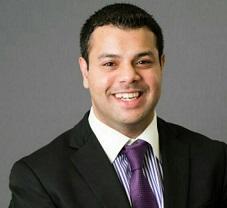
From time to time, members of the Conservative Muslim Forum write relevant articles elsewhere, and permit us to reproduce them on our website. Each such article represents the personal view of the writer, and should not be taken as representing CMF policy.
The article below was first published in on the Guardian newspaper’s website on 7 August 2018.
I’m a Tory councillor. Islamophobia in my party goes beyond Boris Johnson
Hashim Bhatti is the chair of the youth wing of the Conservative Muslim Forum
Anti-Muslim imagery and rhetoric, like the kind used by Boris Johnson, are hurting my party. It’s time for an inquiry
I joined the Conservative party because it was a party of aspiration, one that promised I could realise my dreams if I worked hard. It’s the only party I have ever joined. And why wouldn’t I? It has produced the first female Muslim cabinet minister (Baroness Warsi), the first Muslim home secretary (Sajid Javid) and the first Muslim MEP (Syed Kamall).
I am a dedicated member of the party and a councillor in Windsor. I chair the youth wing of the Conservative Muslim Forum. I have been active in Conservative politics for more than eight years, and in all that time, I never had any bad feeling directed towards me because of my religion. However, I have been alarmed recently by the direction in which the party is going in tackling Islamophobia.
I want to talk in a personal capacity – not as a councillor, but as a member of the party and a concerned citizen – about something that I sense has gone wrong with the Tories. It is something that, perhaps, was always there in some form, but it has undoubtedly become worse since the Brexit vote in 2016. It is a feeling that Muslims are not being listened to when they express concerns about the bigotry they face.
The vast majority of Conservatives are, of course, entirely decent people. But the party has troublemakers, and these often come to light when discussing issues of race and religion. When I became a member, the party was in the process of modernisation under David Cameron. It was an exciting and optimistic time for a young Muslim to join. Sure, there might still have been some prejudiced attitudes on the fringes, but at last, the Tories were providing a home for the large number of ethnic minority voters whose political sympathies were on the centre right. The old stereotype that black and minority ethnic communities would simply vote en masse for the Labour party was crumbling away, and it was good to see it go.
Eight years later, things feel very different. Theresa May, who might once have been relied on to carry on Cameron’s work of modernisation, has been less engaged than her predecessor. In fact, she has been entirely consumed by the Brexit debate while the BAME vote has steadily eroded. Recruiting young members under Cameron was easy, but now it’s become much harder. For example, a young Muslim Conservative whom I spoke to a couple of weeks ago has left the party because she feels she is not welcome anymore.
There were ominous signs before the upheaval of 2016. When Zac Goldsmith fought Sadiq Khan for London mayor in May of that year, the Conservatives ran a disgraceful campaign. Cynically taking advantage of the febrile atmosphere created by Islamic State attacks in Britain and France, the Tories tried to associate the Muslim Labour candidate, Sadiq Khan, with extremism. A party that had appeared to be making progress on the matter of racism abruptly went backwards.
Since then, there has been a steady increase in incidents involving Conservatives expressing appalling views about Muslims. Several incidents from this year alone reveal the mindset in some corners of contemporary conservatism. In March, the Conservative MP for Harrow East, Bob Blackman, posted on Facebook an article from a US website that carried the headline “Muslim Somali sex gang say raping white British children ‘part of their culture’”. Last October, he hosted Tapan Ghosh, an anti-Muslim Hindu hate preacher, in parliament. In July, Michael Fabricant, MP for Lichfield, shared a picture of Sadiq Khan with a pig. The image was of such ghastly, puerile and overt racism that it feels unseemly to describe it here. Blackman and Fabricant both apologised, but what is disturbing about these events is that both men looked at unambiguously Islamophobic material, saw nothing wrong with it and had no hesitation in sharing it publicly.
This week, the former foreign secretary, Boris Johnson, took to the pages of the Daily Telegraph ostensibly to argue against the Danish ban on the burqa. In doing so, however, he found himself comparing women to “letter boxes” and “bank robbers”. This is language that, given the recent lapses into anti-Muslim rhetoric and imagery, was demeaning, insensitive and unnecessary, to say the least.
The Conservative chair Brandon Lewis yesterday asked Johnson to apologise. But Lewis continues to reject calls for an inquiry into anti-Muslim bigotry made by such figures as Warsi, Mohamed Sheikh and the Muslim Council of Britain. These calls remain necessary. The inquiry must be independent, and carried out, perhaps, by a retired judge or a QC. It must have access to the senior leadership but should also speak to grassroots Conservatives across the country, Muslim and non-Muslim alike. It could start by drafting a definition of Islamophobia similar to that of antisemitism developed by the International Holocaust Remembrance Alliance.
Any fears that such an inquiry would harm the party’s electoral chances should be put to one side. The danger of further isolating Muslims and other ethnic minority voters as well – not to mention how corrosive Islamophobia is to the party’s moral core – is of greater concern. The question is not so much whether we can identify individuals with invidious beliefs, but what it is about the Conservative party that leads bigots to believe that they will find a home here. If we become a party that is hostile to the Muslim community, it will be through choice. We have a fresh opportunity to connect, listen and to re-engage with the Muslim community. We should take it.


